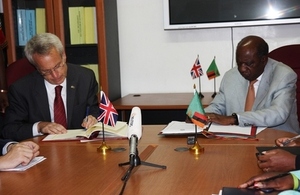Deputy High Commissioner discusses Double Taxation Treaties
The Deputy High Commissioner Sean Melbourne participated in a public debate on 11 March about Double Taxation Treaties. Mr Melbourne said:

DTA signing ceremony
A new comprehensive Double-Taxation Agreement between the United Kingdom and the Republic of Zambia was signed in Lusaka on 4 February this year.
The Agreement replaced the existing Double Taxation Agreement signed in 1972. Zambia requested the renegotiation of the original document, which had become somewhat dated. The new Agreement, which hasn’t yet come into force, can be found on the HM Revenue and Customs website, which is roughly the equivalent to the Ministry of Finance here.
In general, Double Taxation Treaties are agreements between two states that are designed to
-
Protect against the risk of double taxation where the same income is taxable in two states;
-
Provide certainty of treatment to facilitate cross-border trade and investment and
-
Prevent excessive foreign taxation and other forms of discrimination against UK business interests abroad.
Double Taxation Treaties are also drawn up to protect the Government’s taxing rights and to protect against attempts to avoid or evade tax.
They also contain provisions for the exchange of information between national taxation authorities.
There are more than 3000 DTA’s worldwide. The UK has agreements with around 120 countries. The UK seeks to encourage and maintain an international consensus on cross-border economic activity and to promote international trade and investment.
To this end the UK plays an active role in the Organisation for Economic Cooperation and Development (OECD).
The UK and Zambia have a strong partnership. In part it is based on a substantial development cooperation programme, which last year reached its biggest ever size.
But as Zambia grows more prosperous, it is important that it also has a strong commercial basis.
The new Agreement takes into account changes in the taxation policies of both Zambia and the UK, and of international developments in this field. A particularly important new provision, which I have alluded to already, is for the exchange of information between our respective financial authorities to help combat tax evasion. This is based on the latest OECD guidelines. There was only a very limited provision in the 1972 Treaty.
The new Agreement therefore underpins the commercial relationship, helps prevent discrimination and creates a more level-playing field for businesses. Without an Agreement, a person or business may find that he is obliged by domestic laws to pay tax on profits where he/she is resident and again in the country in which the gain is made. This would obviously deter foreign direct investment.
Tax is of course a crucial issue. There has been a lot of debate here in Zambia about how to ensure that multinational companies such as those operating the mines pay their fair share of taxes. The UK has been at the forefront of getting the OECD and the G20 to agree new international standards to make it easier to ensure that multinationals pay their fair share of tax across the world.
It is equally important to get the rules right for taxes outside the mining sector. The balance of taxes such as Value Added Tax, Income Tax (PAYE) and property taxes is a key issue.
The UK has been active in assisting the Ministry of Finance and the Zambia Revenue Authority in this area. We are supporting capacity building in the Finance Ministry’s Tax Policy Unit. We are assisting the ZRA to improve its monitoring of mining production. We are helping the ZRA to ensure that goods on which no tax is paid - because they are produced for export - actually leave the country. And we included provisions for exchange of information between UK and Zambian tax authorities in the recently-signed Double Taxation Agreement. This will help the ZRA and its UK counterpart deal with any tax evasion by individuals or companies operating in the two places.
Thank you
Note:
The event was organised by the Centre for Trade Policy and Development (CTPD) in Lusaka, Zambia. Other speakers were Mr Patrick Kryticous (Action Aid) and Mr Felix Daka (Cross Borders Trade Association) and moderated Simon Ng’ona (CTPD)
Updates to this page
Published 13 March 2014Last updated 14 March 2014 + show all updates
-
Missing text added
-
First published.